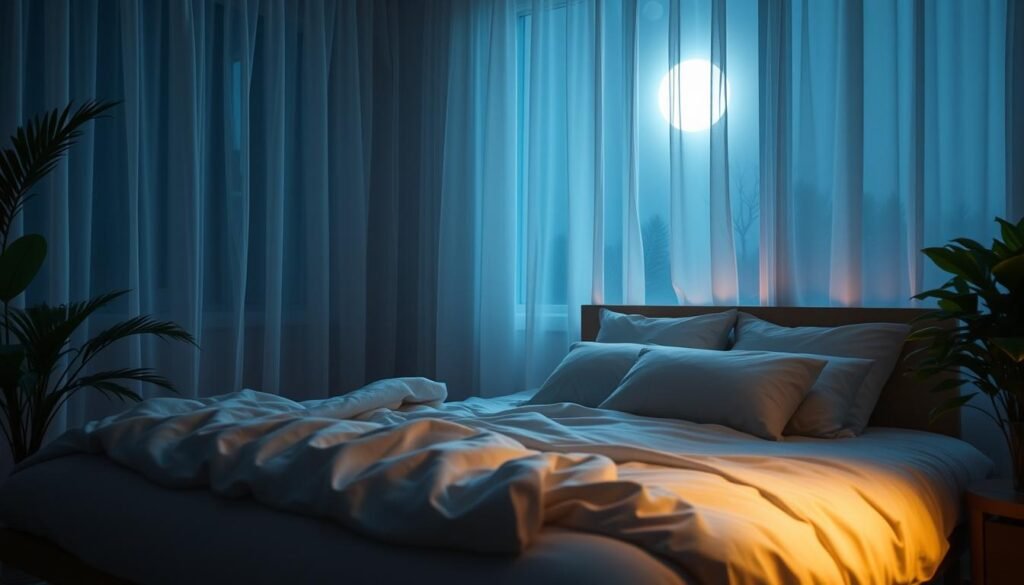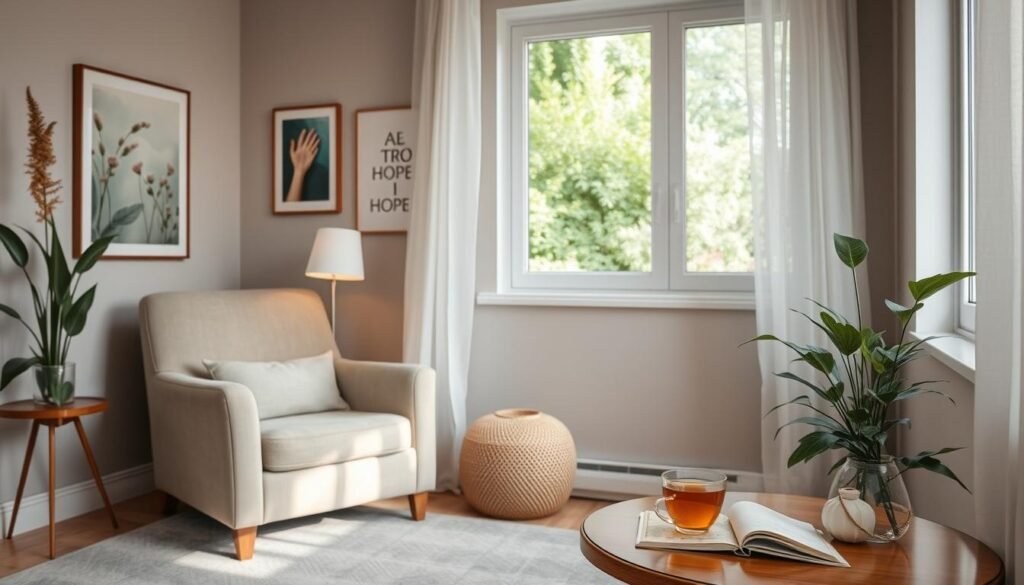Did you know up to 40% of adults face insomnia each year? This makes it the top sleep issue in the U.S. Also, about 40 million adults deal with anxiety disorders. This is almost 18% of our population annually. These numbers show a big concern for mental health help. Many people can’t find good ways to feel better. Antidepressants might help those with both anxiety and insomnia. They could offer some relief. In this piece, we’ll look into how these meds work. We’ll talk about the types you can find and what they do. Plus, we’ll cover their benefits and any risks.
Key Takeaways
- Insomnia is a big problem for 30 to 40% of U.S. adults.
- Each year, anxiety affects close to 40 million Americans.
- Antidepressants help up to 70% of those who try them.
- Typically, people see their symptoms get better in 2 to 4 weeks.
- Talking therapies along with antidepressants can make treatment even better.
Understanding Anxiety and Insomnia
Anxiety and insomnia are big challenges for mental health, touching lives worldwide. Anxiety can make someone feel intense worry or fear. This often harms how well they sleep. Insomnia means having trouble starting or keeping sleep. This makes anxiety even harder to deal with. Together, they can make life really tough.
In the US, many adults fight sleep issues. This shows how complex insomnia and anxiety are when linked. Stress, not sleeping on a schedule, too much caffeine, using screens late, and overthinking make things worse. It’s key to work on these habits for better sleep.
Learning about the link between anxiety and sleep is the first step. For better sleep, recognizing consistent sleep habits helps a lot. It’s also about seeing how anxiety changes sleep. Finding ways to lessen anxiety is key to improvement.
Common Types of Anxiety Disorders
Anxiety disorders affect many people’s lives in different ways. Each type has unique features but often leads to problems like sleep trouble and more stress. Knowing about these disorders is key to helping those affected.
Generalized Anxiety Disorder (GAD) affects a lot of adults in the U.S. every year. People with GAD worry a lot about many things, even when there’s no need. Medications like SSRIs are often used to help, starting to work in a few weeks.
Panic Disorder involves sudden panic attacks and the fear of more attacks. These can make people avoid places where they might panic. Treatments include SSRIs or therapies like CBT to control symptoms.
Social Anxiety Disorder causes extreme fear of social settings. This might make it hard to speak in public or meet new people. Though SNRIs can help, SSRIs are usually the top choice because they help more broadly.
Specific Phobias are extreme fears of certain things or situations, leading to a lot of avoidance. Treatments can be exposure therapy, CBT, or sometimes medications if the fear is very strong.
Obsessive-Compulsive Disorder (OCD) features unwanted thoughts and repeated behaviors. SSRIs help, but therapy is also important to control the behaviors and anxiety that come with OCD.
Post-Traumatic Stress Disorder (PTSD) happens after a traumatic event. It can cause flashbacks, nightmares, and a lot of anxiety. Treatment usually involves both medication and therapy to deal with emotional and psychological effects.
One common issue with these anxiety disorders is how they can mess up sleep, leading to insomnia. By treating these disorders, people can sleep better and improve their quality of life.
Insomnia: A Deeper Look
Insomnia means you don’t sleep well. It leads to feeling tired during the day and poor health over time. There are two types: short-term and chronic. Each has different causes and effects. Knowing about insomnia is important because it’s linked with many health problems.
Many people with mental health issues also struggle with insomnia. For example, 60% to 90% of those with major depression have insomnia when they’re feeling down. It’s vital to find good sleep therapy to help with insomnia and related mood problems.
Chronic insomnia isn’t just about not sleeping. It can increase the risk of suicide and other serious issues. For people with bipolar disorder, 60% have insomnia during their low phases. Also, 20% to 30% may sleep too much, causing fatigue during the day.
If you don’t sleep well, it can worsen your mental health. Fixing chronic insomnia can include changing your lifestyle or sleep therapy. Sometimes, medicine and talking to a therapist help too.
To understand how common insomnia is and its effects, look at this info:
| Population | Insomnia Prevalence (%) | Associated Conditions |
|---|---|---|
| Patients with Major Depression | 60-90% | Sleep disturbance |
| Patients with Bipolar Disorder | 60% during Depressive Episode | Insomnia or Hypersomnia |
| Patients with Persistent Insomnia Symptoms | Varies | Increased suicide risk |
| Bipolar Disorder: Prolonged Sleep | 20-30% | Daytime sleepiness |
Fixing chronic insomnia involves many steps. This includes therapy, making changes to your surroundings, and maybe medication. By understanding insomnia’s big impact, we can work towards better sleep and health.
How Anxiety and Insomnia Are Related
Anxiety and insomnia can create a tough cycle for those dealing with them. People with anxiety often find it hard to sleep. This is due to heightened alertness, or hyperarousal. Hyperarousal can make falling asleep hard.
Once asleep, staying asleep becomes the challenge. This leads to being restless at night. And it makes you feel tired and not well-rested during the day.
Not getting enough sleep raises cortisol levels. Cortisol is a stress hormone that makes anxiety worse. Over time, a lack of sleep can cause negative feelings and even depression. It’s proven that sleeping well is key to controlling negative emotions. So, it’s crucial to tackle both anxiety and insomnia for better health.
Treating insomnia requires using different methods together. Good sleep hygiene, medication, and Cognitive Behavioral Therapy (CBT) can help. Good sleep practices include a regular bedtime, relaxation before sleep, and cutting back on caffeine. These steps can ease anxiety and improve sleep quality.
Because anxiety and insomnia are so closely linked, getting professional advice is key. For more tips on handling anxiety and sleep problems, check out resources like the one at Sleep Foundation.

Antidepressants for Anxiety and Insomnia
Antidepressants are useful for anxiety and insomnia. They work in different ways to improve sleep and reduce anxiety. This section looks at how they help and the types available.
Overview of Antidepressants
SSRIs like fluoxetine (Prozac) and sertraline (Zoloft) are commonly used. They have fewer side effects and can treat both anxiety and insomnia. TCAs such as imipramine and amitriptyline are also used but might have more side effects.
How Antidepressants Improve Sleep
Antidepressants boost sleep quality in several ways. Drugs like bupropion and quetiapine are good for mood stability, aiding sleep. Quetiapine is especially good for deep sleep.
TCAs, including amitriptyline and doxepin, help you fall asleep. But, they don’t necessarily improve the quality of sleep. Clonidine helps those with anxiety and sleep apnea by improving sleep quality.
It’s key to remember that antidepressants may take six weeks to work fully. Sticking to your prescription is crucial for anxiety and insomnia relief.
| Antidepressant Class | Examples | Sleep Impact | Side Effects |
|---|---|---|---|
| SSRIs | Fluoxetine, Sertraline | May improve sleep with reduced anxiety | Generally fewer bothersome side effects |
| TCAs | Imipramine, Amitriptyline | Aids in sleep initiation but may not enhance architecture | Tend to cause more side effects |
| Other | Bupropion, Quetiapine | May stabilize sleep patterns and enhance depth | Fewer sexual side effects |
| Clonidine | – | Improves sleep quality in sleep apnea patients | May cause sedation |
Types of Antidepressants Used for Anxiety and Insomnia
Antidepressants are key in treating anxiety and insomnia. There are several types, each working differently in the brain. Knowing about them helps people make better choices for their treatment.
Selective Serotonin Reuptake Inhibitors (SSRIs)
SSRIs are very common for treating anxiety and long-term insomnia. Medicines like fluoxetine, citalopram, and escitalopram are often used. People might need to take them for 4 to 8 weeks to feel better. Even though SSRIs usually have less side effects, they can still cause nausea, weight changes, and tiredness.
Tricyclic Antidepressants (TCAs)
TCAs are older but still important for some people with anxiety and sleep problems. Amitriptyline and nortriptyline are two examples. They’re powerful, but they can make you feel sleepy or change your appetite. They’re a choice for those who don’t do well on SSRIs or SNRIs.
Other Antidepressants (e.g., Trazodone)
Drugs like trazodone and bupropion are other options. Trazodone is used for both depression and anxiety because it helps you relax. These meds can be helpful but might cause dizziness or affect sexual function. You can learn more about these drugs by checking the overview of antidepressants from trusted sources.

Benefits of Antidepressants for Sleep Disorders
Antidepressants are key in managing sleep problems, like insomnia. They boost sleep quality in several ways. A big plus is they help you sleep without waking during the night.
They also make your sleep deeper and more refreshing. This leads to better days, helping you function well even with anxiety or insomnia. They are crucial for treating insomnia, especially with anxiety issues.
- Improved sleep continuity: Antidepressants reduce waking up at night, leading to longer, uninterrupted sleep.
- Enhanced sleep architecture: They improve sleep quality, including more REM sleep.
- Better daytime functioning: Better sleep leads to improved mood, focus, and productivity.
While helpful, antidepressants can have side effects like drowsiness and stomach upset. People react differently to these medications. That’s why a doctor’s guidance is important.
| Benefits | Description |
|---|---|
| Improved Sleep Continuity | Reduces nighttime awakenings and leads to longer sleep. |
| Enhanced Sleep Architecture | Strengthens deep sleep phases, enhancing overall sleep quality. |
| Daytime Functioning | Boosts focus, mood, and work performance by improving sleep. |
Potential Side Effects of Antidepressants
Depression medication can greatly help mental health. Yet, it’s vital to know about possible side effects. It’s important to check these effects, especially in the early treatment months. Patients often see their healthcare provider every 2 to 4 weeks. They want to make sure the medication is doing its job well.
Short-term Effects
Starting antidepressants may lead to short-term side effects. Selective serotonin reuptake inhibitors (SSRIs) and serotonin-noradrenaline reuptake inhibitors (SNRIs) can cause issues like:
- Feeling unwell
- Insomnia
- Gastrointestinal issues
- Decreased libido
Tricyclic antidepressants (TCAs) have their own short-term side effects:
- Dry mouth
- Dizziness
- Weight gain
- Heart rhythm problems
Young people under 25 might face serious risks, such as suicidal thoughts, when starting treatment.
Long-term Considerations
Long-term antidepressant use has risks too. SSRIs and TCAs might up the risk of type 2 diabetes. This is often linked to weight gain from these meds. Seniors on SSRIs could face hyponatraemia, meaning low sodium levels. This leads to headaches, confusion, and restlessness.
Serotonin syndrome is a serious risk from long-term use. It can cause life-threatening symptoms like confusion and shaking due to high serotonin levels. This occurs when antidepressant doses are increased.
About 20% of patients might face withdrawal symptoms if they stop their meds suddenly after a few weeks. This shows why it’s crucial to monitor patients not just at the start but throughout their treatment.
| Antidepressant Type | Common Short-term Side Effects | Long-term Risks |
|---|---|---|
| SSRIs | Feeling unwell, insomnia, decreased libido | Hyponatraemia, type 2 diabetes risk |
| SNRIs | Gastrointestinal issues, sexual dysfunction | Types 2 diabetes risk |
| TCAs | Dry mouth, dizziness, weight gain | Heart rhythm problems, overdose risk |
Alternatives to Antidepressants for Treating Anxiety and Insomnia
Many people look for anxiety relief and insomnia treatment without using antidepressants. They find success in non-drug methods, which can greatly help. These approaches tackle both anxiety and sleep troubles effectively.
- Cognitive Behavioral Therapy (CBT): This method is great for fighting anxiety and sleeplessness. It teaches good sleep habits and ways to calm your mind. This improves sleep and lowers anxiety.
- Regular Exercise: Staying active is key to feeling better and sleeping well. It’s proven to help with both sleep problems and anxiety, especially when used with other treatments.
- Herbal Remedies: Some people find herbs like valerian root, lavender, and passionflower helpful. These aren’t officially approved for mental health, but they might aid in improving mood and sleep.
- Other Medications: There are certain meds meant for sleep and mood issues. They include melatonin receptor agonists and drugs other than benzodiazepines. These are mainly for short-term use.
Anxiety and insomnia often go hand-in-hand with depression, affecting about 90 percent of those with depression. Chronic insomnia means having sleep issues at least three times a week for more than three weeks. It’s important to talk to a professional if you’re considering alternatives to antidepressants. A combined approach usually works best.
Using natural methods for anxiety relief and insomnia treatment can be very helpful. Studies back up holistic approaches, showing that lifestyle changes can reduce symptoms. Check out this guide on natural antidepressants here for more info.
Seeking Professional Help for Anxiety and Insomnia
Getting professional help for anxiety and insomnia can really change your life for the better. Qualified healthcare experts are key to uncovering what’s really going on. Every treatment is unique, so it’s important to find what works best for you.
Therapists and psychiatrists work together to create effective treatment plans. Cognitive Behavioral Therapy (CBT) is one of the top treatments for sleep issues. It usually takes 6 to 8 sessions, which is quite manageable for most people.
While sleep meds might help short-term, they don’t always work well long-term. That’s why therapy could be a better option for lasting improvement.
There are many ways to get help:
- Federally funded health centers offer care that fits your budget.
- Colleges often have affordable therapy for anxiety.
- Drug companies provide some medicines for free or cheap if you’re uninsured.
- Generic drugs are a less expensive choice than name brands.
The way we get mental health support is changing. Mental health apps and online therapy are making help more affordable and easier to access.

| Resource | Cost | Notes |
|---|---|---|
| Therapy Sessions (CBT) | $100+ | Typically requires 6-8 sessions for insomnia |
| Federally Funded Health Centers | Based on income | Affordable options for lower-income individuals |
| University Therapy Programs | Low-cost | Accessible for students and community members |
| Pharmaceutical Patient Assistance Programs | Little to no cost | For uninsured patients |
| Generic Medications | More affordable | Cost-effective substitute for brand-name |
Finding the right help for anxiety and insomnia is crucial for good health in the long run. The mix of therapy, medications, and community support creates personalized and effective care.
Conclusion
Understanding the link between anxiety and insomnia is key for good mental health care. Antidepressants help a lot with these issues, especially for those also dealing with mood problems. We have different types of antidepressants, like SSRIs and TCAs. They help but remember they can have side effects like changing sleep patterns.
But don’t just focus on medicine. Things like cognitive-behavioral therapy and changing your lifestyle are also important. Talking openly with doctors helps you find the best plan for you. This way, you work towards better mental health and sleep. As research gets better, we’ll find even better ways to help people with anxiety and insomnia.
Since many people have trouble sleeping, using both medicine and other methods is best. It’s always a good idea to ask for help and look into different solutions. This approach will improve mental health and sleep quality for everyone.